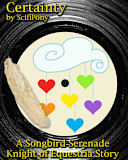Be an Author: Dialect · 7:40pm Nov 10th, 2018
How much should you use dialect or constructed language? Very little. Note that I did not write not at all.
By dialect, I mean implying a southern drawl, or using specific words that imply a regional accent like “Darling!”1 or “Don’t ya know?“ or “A?” or “Brilliant”. By a constructed language, I mean everything from completely made up words to totally made up grammars. This includes writing in English but using a foreign grammar like Spanish or Japanese.
The problem here is multifold. First, it takes time to research and construct a language. I treat any extended research as a symptom of procrastination, especially if it is trivial2 to a plot, like making up a language usually is. Second, it shifts the focus of the story from the plot and characters to the writing. You should always strive to make your writing invisible to the reader; it’s solely a vehicle for your story, and it should be a convertible made of clear plastic where possible. If it gets in the way, it bogs down the story. Last, even when done expertly, it represents a learning curve for the reader. If the investment of the reader is low, as in a free story on a fan fiction site, they3 may just use the back button (and may click dislike first). If the investment is higher, as in a sequel or, gasp, a paid-for book, it may annoy the reader—making them less likely to want to read your next work.
In MLP, what would AJ be without her countryisms? There are obviously circumstances where you have no choice but to write dialect and constructed language, but for the sake of the reader, and the invested time it takes you to write a story, write as little of it as possible—and only as dialogue (more on that later). Ideally, use as few howdy’s, t’wases, and ain’t’s as possible—enough to ensure the reader hears the voice in the first few pages where the character first appears. Then, as you continue writing the story, insert fewer and fewer—just the ones you must. Do this and your reader will continue to hear the accent even when you aren’t writing it! Next time you read a published novel with a character that speaks a dialect, pay attention.
As I said above, write dialect only as dialogue. Very few writers in English write formally the way they speak colloquially. It implies a lack of education. That said, even if you want to imply a lack of education, the rules of the previous paragraph apply here. If you must, use it sparingly and taper off. When writing in third person, prose outside of dialogue in dialect will imply something about the narrator. Is the narrator part of the story? From the same locale as the protagonist? Don’t trip yourself up. When writing in first person, the entire story is dialogue. Dialect use here is a land mine. Trust me on this: if you write the prose in standard English and flavor the dialogue with only necessary dialect, nobody will notice it’s missing. They won’t notice how easy your story is to read, either, which is the point. Second person authors, you are on your own, though I suspect dialect is a total no-no.
I am a feminist SF writer. I write about alien cultures and gender roles. To me, the entire pony world is one populated with aliens, and damn good ones. As an SF writer, I created at least a dozen aliens and a few alien cultures. In one novel, I decided to use constructed language, in this case using the syntax of Bahasa Indonesia, a former pidgin language now the official language of Indonesia. It was simple and featured an easy to discern syntax that included simple conjugations and one form of plurals (the word written twice). I wrote totally in English, repurposing words for alien concepts since neither the humans nor the aliens could make the sounds of each other’s language, but could learn what the other was saying over time. Some of the alien people had horns that sprouted downward from their chins, and others didn’t, and since the aliens had no discernible gender, I just used saberchin-this and saberchin-that for me and for that other person, even though the saberchins subtly disliked the human usage of the pronouns they’d assigned the saberchins. It enhanced the mystery of the horns. I made it work, but it was hard. Except for dialogue and the use of pronouns in prose, I kept the alien-speak to a minimum. Indeed, just the use of the pronouns was enough.
Do you really want to spend the time to do this type of thing? If you do, study what I’ve said. Beware of using it as an excuse to procrastinate. And be sure to be fluent in that language when you write it.
My last word on constructed languages is that if you are writing in someone else’s universe and a dialect or constructed language is used, you must use it fluently. Do you know when to use somepony, nopony, and everypony? Boy howdy (that’s an allusion folks), did I get an earful when I submitted a story to Equestria Daily for a story post that misused the words. There are rules. Use them.
As an exercise, I suggest you write a short story with a character speaking dialect. AJ would be great. Start the story with her speaking pure Southern, then slowly ease off until by mid-story, she’s speaking standard English except for a dagnabit or such. Ask yourself, where is the happy medium? You may be surprised.
My story Knight of Equestria: Certainty features a character from Trottingham. When she appeared in the My Little Pony: The Movie, she had a noticeable accent. Does she in my story?
1 Stereotypically New England, Wisconsin, Canada, and Britain (i.e., Trottingham).
2 If your plot involves intimate knowledge of bridgeworks, by all means, research it. Still, a day of research is not the same as a month.
3 You may have noticed that in my Be an Author essays—but not in my fiction—that I no longer use the grammatically generic pronouns he/him or she/her. Instead, I substitute they/them regardless of whether the pronoun should be singular or plural. It’s a new standard. This is a conscious decision that I am testing out in these articles. I point this out now because this is a dialect. In this article, it functions as an additional example. Go ahead. Reread the article. Did you notice it? What did you think? Did it interrupt you or was it transparent? Comment on it.




This is a very interesting post, which I certainly think was well worth my time to read. Thank you for it. That should be borne in mind from here on in.
Or Rarity-ese.
Does the show, though? "Somepony" has sometimes included non-equines, while Twilight uses "people" in the S2 finale. Which brings up another point: what to do about oddities supported by canon, such as AJ's fairly frequent use of singular "y'all" in S1 especially.
Personal opinion, but: good. Singular they is something I've used for many years in all but the most formal circumstances. I don't know whether it's more accepted here in England than elsewhere in the world -- but in informal writing, at least, it's really not controversial here any more.
One other point that comes to mind: those of us who speak British English natively have to write to at least a small extent outside what is "Standard English" to us when we're featuring MLP characters in dialogue and/or first person. "The horseshoe fitted" for example is standard BrEng but not standard AmEng.
Personally, I write some characters in dialect, such as the Apples. Others, such as Babs Seed, I don't.
4965988
Wow. Thanks for your post. I am a new convert to they/them, and it's interesting to read your take on it.
Good points about anycreature and things like hoof-a-cures and ponyquins. My problem was I tried to make one of the words plural while not adding a space between the the two elements of the compound word. It's apparently a a no-no.
Dialect has pitfalls. The worst is fluency. As a British reader, you'd be the best critic for my use of Trottingham dialect in Certainty, the tagged story. While I consume a lot of BBC television, I bet I didn't get it exactly right. If you like the story, there are four additional completed stories with the same Trottingham character that I am Proofreading. An in-dialect pre-reader would be nice. Hint hint.
4965995
Thank you. Just wanted to pay it forward with stuff I learned the hard way. Cuts Too Deeply features Babs and her Hooflyn dialect. It was the hardest part of writing the story, but it added verisimilitude especially in the Hooflyn scene. It takes finesse and restraint to write dialect well.
4966065
I sometimes get the feeling that BrEng in general is less formal/fussy about grammar than AmEng. A good example is our much spottier use of the subjunctive. In everyday usage, "It is vital that she do her homework" would seem stuffy and old-fashioned to us. "It is vital that she does her homework" is what sounds natural to me.
You mean "anyponies" and the like? Yes, I see the point now. That would look strange.
Well, there is more than one British dialect, of course, but as it's a short fic then I'll give its Trottingham dialect a look in the next couple of days and send you a PM if I find anything that jars.
I disagree on this, but we are probably from two different writing styles. I always prefer to write the character as I hear them in my head, as close to as I hear them in my head, and that's how I tell people how to write.
Then again, I go on poetic sensory binges, so I might not be trying to tell the story or hide the writing so much as writing in an interesting way to tell the story...
4966068
I've noted with accents, especially the Apples, that they don't either come across right or sound like they've got burnt tongues. Characters from Manehattan can sound even stranger; one I recall reading had a character saying the word 'youze' to such an extent it sounded like somebody impersonating somebody from the city!
4966284 As a reader, you really can tell the better writers by how invisible their writing is, and youze guys are pointing out.
As a reader, you really can tell the better writers by how invisible their writing is, and youze guys are pointing out. 
Dialect is very hard, which is why I advise every author to be circumspect or avoid it all together... or to ask a native speaker for the choice favorites and to vet the musicality of your usage.